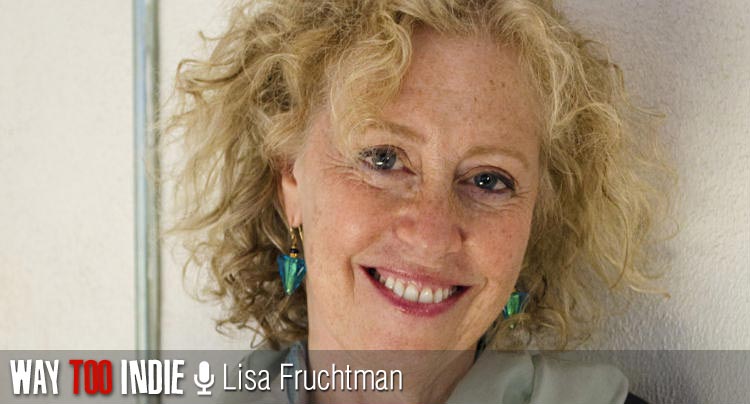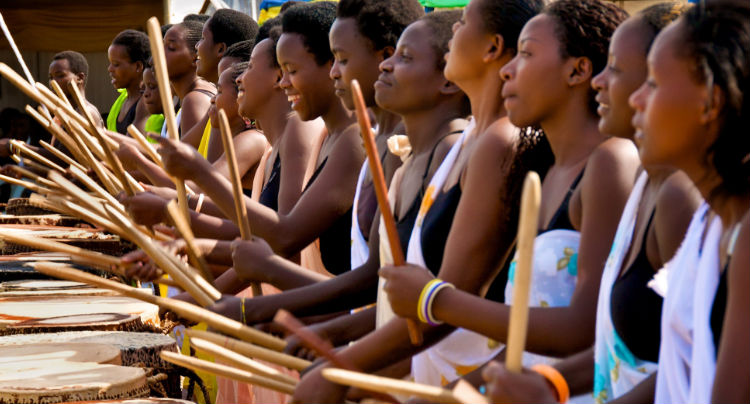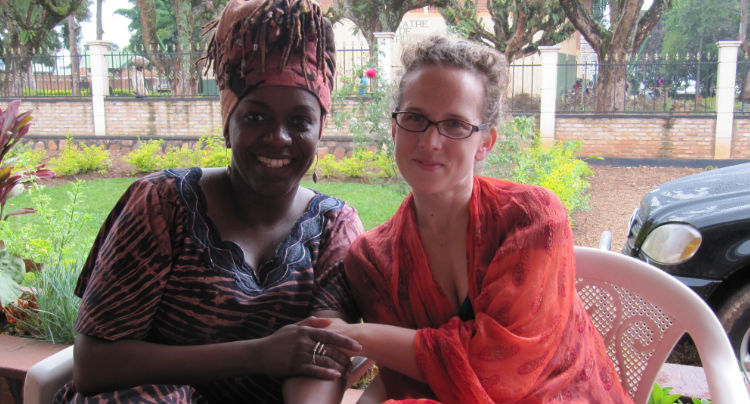Lisa Fruchtman Talks Ice Cream and Drumming in Rwanda

Following the unlikely partnership between a Rwandan women’s drum troupe and New York’s Blue Marble ice cream shop as they work together to bring Rwanda it’s first taste of ice cream, Sweet Dreams is a beautifully crafted film of hope and opportunity in the wake of unimaginable tragedy. Sibling directors Lisa and Rob Fructhman, both veterans of the movie industry, set out to project a more positive, hopeful image of Rwanda to the world that was more inviting than the depressing imagery Rwanda is typically associated with.
Lisa Fruchtman sat with us in San Francisco–where the film is making it’s debut this week (scroll for dates)–to talk about where she got the inspiration to make the film, making ice cream, drumming, and the genocide work in one film, working with her brother for the first time, and much more.
How did you first hear about the partnership between the drummers and Blue Marble?
I heard that this Rwandan playwright had brought women together to drum [and formed] a troupe made up of Hutu and Tutsi women who came together after the genocide and broke the taboo against women drumming. Three years later, the same woman who brought them together to drum met with an ice cream entrepreneur and put the idea out there that they should open up the country’s first ice cream shop. I heard that idea and I thought: Ice cream. Drumming. Rwanda. What? Not three things you normally hear together, right?
You liked that disparity.
Yes. I thought, this is certainly not what we know about Rwanda. I’m like everybody else, where I just knew the devastation of the genocide and wanted to turn away because its so depressing and horrific. First of all, I was interested in the story. Secondly, I thought it would make an amazing movie because it’s a way into the story of Rwanda that you might not want to turn away from. There’s the beauty of drumming and an interesting…something (laughs)…about ice cream! This is a way in that people can enjoy. That’s all I thought about. I brought my brother into the project, who’s a documentarian. We went to Rwanda without knowing much more than what we had heard about.
Did you have an idea of what your narrative would eventually become?
When you make a movie, you have to follow something, right? I wanted my movie to unfold like a story, because I come out of narrative films. The fact that an ice cream project was beginning was something we could follow; it would be interesting whether it failed or succeeded. It was like a narrative spine. Of course, we didn’t just want to make a movie about an ice cream shop. That’s a small story, and in Rwanda there’s a lot of other things to talk about. It was the spine of the story, but not the whole story.
When my brother and I got on the plane to Rwanda, which was less than six months after I heard the story, we hadn’t done any pre-production, we hadn’t been to Rwanda before, and we hadn’t met the women yet. We didn’t know what we would find. We shot over the course of a year and a half, going back and forth four times to get to know the women and find our story.
When I started watching the film, I thought it was going to be about women drummers in Rwanda fighting against gender imbalance. When the ice cream angle hit, I thought, “What the hell?!” You threw me for a loop, but you eventually make the three main narrative elements–the drumming, the genocide, and the ice cream–work harmoniously. How did you strike that balance and make it work so seamlessly? Was it hard to construct?
It was very, very hard to construct. We worked it out in the editing, which took over a year. We kept saying to ourselves, “We’re both experienced editors! How could this possibly be taking us so long?” It was very hard. These three things are on one hand very connected, on the other hand very different. Tonally, we’re going up and down between joy, humor, and trauma. We tried many things. We tried putting the genocide up front, but that didn’t work for us.
Why not?
It’s a question of balance. We were aware that when we introduce the ice cream shop it’s like, “Huh? What?” We were aware of all these junctions, and we wanted to make them work for us instead of against us.
As the film goes on, you begin to realize that the drumming and the ice cream represent the same thing.
Exactly.

You whittled down what I am sure was a ton of footage down to 90 minutes, and you probably had to get rid of a lot of good stuff. I love that you spend so much time on the repairing of the ice cream machine at the shop! I love that focus.
Many documentaries are informationally driven. They have a narrator, or they have a lot of information on cards. We were making more of a verité movie, in the sense that you just sort of put yourself in that world, become a fly on the wall, and film what’s going on. We were balancing our narrative structure of these intimate interviews and performances with these verité moments. This is real life here. We realized that as we watched it unfold, it had this wonderful quality of suspense and humor. We never knew what was going to happen. We didn’t know if the machine would be fixed…sometimes we didn’t even know what they were saying! We only learned afterward when we read the transcripts. Some of the time, we had our interpreters with us.
Did they interpret on the fly?
Yes. People don’t quite realize that we made this movie where people were speaking Kinyarwanda, which we don’t speak. It’s a very delicate process, building trust in people when you don’t share a common language. In our interviews–which were very emotional, as you saw–we had our interpreters, who were wonderful young people from the university, all of whom were survivors of one side or the other, so they were sensitive to the situation. They also had English skills. They would interpret for us as the interview was going, but only in the most general way, so that they didn’t interrupt what the people were saying. We had other students doing transcriptions so that we could see line by line what they were saying. As the situation in the ice cream shop was unfolding, we had no interpreters. We were shooting based on intuition.
What was it like watching people eat ice cream for the first time?
It was pure delight! They liked the ice cream, but they aren’t used to eating cold things. They don’t have a lot of experience with things that are cold because they don’t have refrigeration. They had to learn how to eat ice cream.
Can you explain why it was so taboo for women to form a drumming troupe? Was it sexism?
First of all, I have to say that after the genocide, many men were killed or imprisoned, which allowed women to rise to the top. There are more women in Rwandan Parliament than in any other country in Africa, for instance. I wouldn’t call it sexism; I’d call it history. What people have done. When the women first started drumming, it hadn’t been done before. It wasn’t against the law; it just hadn’t been done before. It was the province of men. Men were skeptical, and they mocked them. “Don’t you have something better to do, like work in the fields or take care of our children?” They just thought it was ridiculous. But, as the women became successful and even earned some money, the men became very appreciative. There’s still a lot of curiosity, but there’s not antagonism. Most of these women live without men, but some of these women have men who are proud of them.
People were open to us as filmmakers, even though they didn’t know what we were doing. As the filming went on, they couldn’t fathom why we were still shooting or what was taking so long. I think what we conveyed to them was that we were interested in presenting them in a different way; not as victims, not as savages, not with a total focus on the genocide.
There are a lot of women in the drum troupe. How did you choose which ones would be the most interesting to film?
That’s the challenge of every documentarian. We talked to most of them. We gathered a lot of stories. That process of finding your characters is so delicate. It’s about finding the right balance. While we were in Rwanda, we visited a lot of homes. Towards the end of our first shoot, we made an announcement saying that we would love to get to know some of them better, meet some of their families. We expected a few people to come forward, and 40 hands shot up! “Come to our house!” We had a signup list, and we spent all of our days visiting them. We always had the camera on so that people would get used to it and people would feel that we were interested equally in everyone. We shot a lot of interviews and a lot of footage. Ultimately, we chose based on stories and how we felt we could best put it together.
You worked with your brother for the first time on this film, which is insane to me considering how long you two have been in the industry. What was it like?
It was kind of insane! We said, “Shall we do this movie together?” and then we got on a plane! We did everything together. We produced together, we directed together. The only thing is that he was behind the camera most of the time and I was not. When we edited, we did it across the country; he was in New York and I was in California. We had clone drives, meaning that we had hard drives with identical footage on them. We sent scenes back and forth, talked on Gchat…we’re very familiar with gmail now (laughs). We edited that way.

What’s the biggest difference between you two in terms of sensibilities?
Rob is very interested in verité filmmaking, just absorbing the atmosphere. I’ve been a feature film editor for a long time, so I’m kind of structurally and narratively driven. I think we brought different strengths to the table. With any team, you have to be wanting to make the same movie, and we did want to make the same movie.
It does feel like a singular vision. You spent a lot of time in Rwanda; did you feel that the country was still bruised, still ailing from the aftermath of the genocide?
As soon as we got to the country, we realized that yes, the country was moving forward–women are in Parliament, people are coming together–and yet, it was only 17 years after the genocide when we were there, and there was an enormous amount of emotional trauma, and it’s always there. We didn’t want to make a movie in which we didn’t address the genocide. It’s a character of the country. It’s very present. You can’t help but be around people and wonder what they were doing at that time or if they had parents that were involved. Everybody was present.
I love that the sign on the ice cream shops reads, “Ice Cream, Coffee, and Dreams.” Is the shop helping the healing process, even in a small way?
These ideas–the drum troupe, the ice cream shop–are kind of quixotic, pie-in-the-sky dreams, but they kind of teach people to have dreams. That’s part of the idea, that you can create a new future for yourself. I don’t think the shop has transformed the country, but I think it has given people an opportunity to come together as a community and enjoy something new.
You’ve been bringing some of the drummers to screenings across the world. How have they enjoyed it?
They just totally get bowled over. They all agreed in contracts that the film would be screened around the world, but we were never really clear whether they could envision that. It was pretty profound for them. One of the things about the film that’s fantastic is that it’s drawn attention to them, which is why we’re able to bring them around with us. They won a big award in Washington D.C., they were invited to England, and now they’re invited to San Francisco for TED Women, on December 4th and 5th. The film is opening on December 6th, and we’re holding the women over here over the weekend! They’re going to be performing and attending the screenings.
That’s going to be a great few days!
I hope people will turn out!
Here’s a schedule for where you can find the film this weekend in the Bay Area. For a full list of screenings and more information, visit sweetdreamsrwanda.com
Opera Plaza San Francisco, CA
Fri Dec 6, 7:00 PM
Q&A with Rob Fruchtman, Alexis Miesen of Blue Marble Ice Cream and Kiki Katese
Tues Dec 10, 7:00 PM
Q&A with Lisa Fruchtman
Thu Dec 12, 7:00 PM
Q&A with Lisa Fruchtman
Shattuck Cinema Berkeley, CA
Fri Dec 6, 7:10 PM
Q&A with Lisa Fruchtman
Sat Dec 7, 7:00 PM
Q&A and special appearance Ingoma Nshya drummers
Mon Dec 9, 7:10 PM
Q&A with Lisa Fruchtman
Wed Dec 11, 7:10 PM
Q&A with Lisa Fruchtman
Clay Theater San Francisco, CA
Sat Dec 7, 1:30 PM – One day only
Q&A with Rob and Lisa Fruchtman, Kiki Katese, and special appearance by Ingoma Nshya drummers
San Raphael Film Center San Rafael, CA
Sunday, Dec 8, 7 PM – One night only
Presented by the Grateful Dead’s Mickey Hart!
Q&A with Rob and Lisa Fruchtman special appearance Ingoma Nshya drummers
